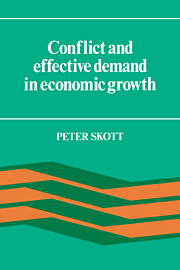Book contents
- Frontmatter
- Contents
- Guide to text notation
- Acknowledgements
- 1 Introduction
- 2 Methodological issues
- 3 A survey of some post-Keynesian and neo-Marxian ideas
- 4 The model
- 5 Ultra-short-run, short-run and steady-growth equilibria
- 6 Investment, instability and cycles
- 7 Finance and money-wage neutrality
- 8 Distributional questions in neo-Marxian and post-Keynesian theory
- 9 Final remarks
- Bibliography
- Index
- Frontmatter
- Contents
- Guide to text notation
- Acknowledgements
- 1 Introduction
- 2 Methodological issues
- 3 A survey of some post-Keynesian and neo-Marxian ideas
- 4 The model
- 5 Ultra-short-run, short-run and steady-growth equilibria
- 6 Investment, instability and cycles
- 7 Finance and money-wage neutrality
- 8 Distributional questions in neo-Marxian and post-Keynesian theory
- 9 Final remarks
- Bibliography
- Index
Summary
KEYNESIANS, MONETARISTS AND THE REAL WORLD
Fluctuations in employment and economic activity characterise all capitalist economies. Are these fluctuations caused by exogenous shocks in, for instance, technology or the money supply? Alternatively, will the economy generate fluctuations endogenously even in the absence of external shocks? Many different answers have been given and the majority view has changed considerably over time.
Keynesian economics dominated the 1950s and 1960s, but at a theoretical level Keynes's ideas have always been met with scepticism. The main criticism of the Keynesian system has been the alleged lack of theoretical foundations. In comparison with Arrow–Debreu theories of general equilibrium, the macroeconomic relations of Keynesian economics have been deemed ad hoc, and already by the mid-1960s the search for microeconomic foundations was well under way.
Parallel to these developments in economic theory came the Vietnam war and 1968 marked the beginning of industrial and political militancy in Europe. The breakdown of the Bretton Woods system, the Yom Kippur war and the oil shock followed in the early 1970s. These events had significant economic repercussions, but the world-wide radicalisation of youth movements and workers alike found no place in the Keynesian system. The Keynesians of the day had accepted the methodological individualism of their neoclassical and monetarist counterparts. Class conflict was alien to their economic theories and, as inflation spiralled, the Keynesians could only observe that the Phillips curve appeared to be shifting in unpredictable ways.
The empirical weakness of Keynesian economics in this area was seized upon by the monetarists. The Phillips curve, they argued, shifts because workers revise their expectations concerning future prices in the light of past inflation.
- Type
- Chapter
- Information
- Conflict and Effective Demand in Economic Growth , pp. 159 - 163Publisher: Cambridge University PressPrint publication year: 1989



